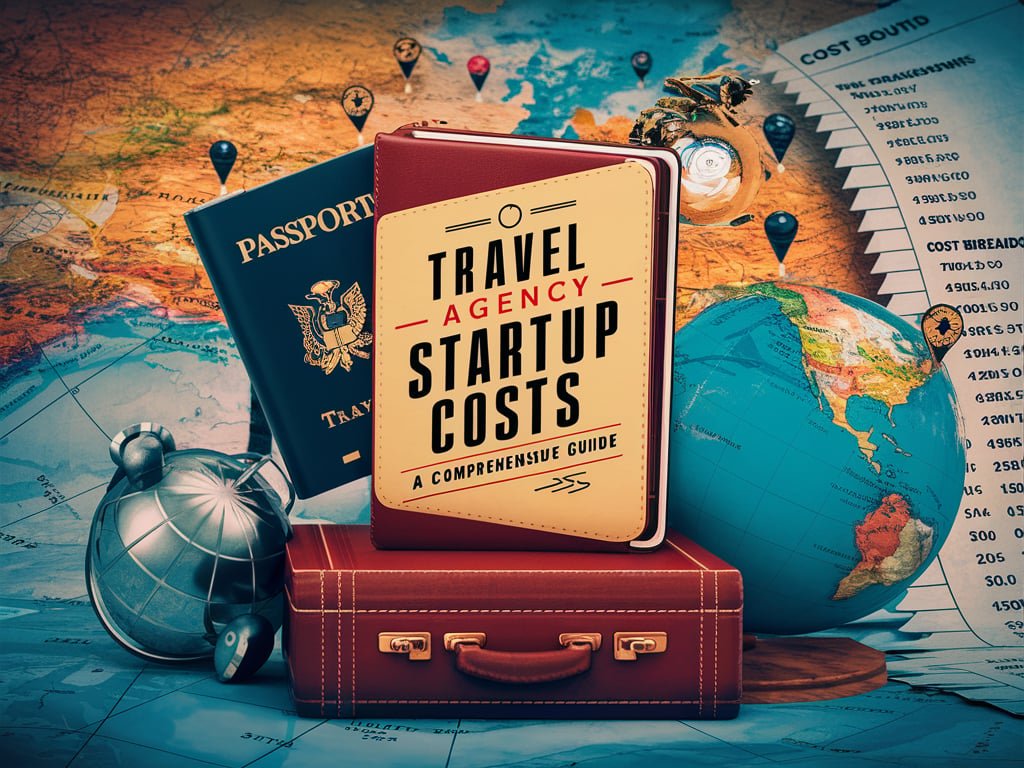Starting a travel agency can be a rewarding business venture, especially for those passionate about travel and helping others create memorable experiences. However, like any business, launching a travel agency requires careful planning and understanding of the associated startup costs. This article delves into the essential costs of starting a travel agency, offering a breakdown of expenses, tips for managing costs, and a financial roadmap to help you launch your agency successfully.
What Are the Costs of Starting a Travel Agency?
Travel agency startup costs can vary widely depending on the type of agency you plan to operate. Whether you’re starting a home-based agency, a storefront location, or an online travel service, understanding your financial needs is crucial.
Common Startup Costs for a Travel Agency
Here’s an overview of the typical expenses you can expect when starting a travel agency:
- Business Registration and Licensing: Like any business, you’ll need to register your travel agency with local and state authorities. This includes obtaining the necessary business licenses, permits, and any special licenses required for selling travel services.
- Travel Agency Insurance: Protecting your business from liability and unforeseen events is critical. Common insurance policies for travel agencies include general liability insurance, errors and omissions (E&O) insurance, and business owner’s policies (BOPs).
- Office Setup: Whether you’re working from home or renting an office space, you’ll need to invest in office supplies, furniture, and technology (such as computers, phones, and internet service). Renting a commercial space will also require budgeting for monthly rent, utilities, and maintenance.
- Website Development and Marketing: In today’s digital age, a professional website is essential for attracting clients and providing travel services. You’ll need to budget for web design, domain registration, hosting, and search engine optimization (SEO) services. Additionally, marketing expenses will include digital advertising, social media campaigns, and traditional advertising methods.
- Accreditation Fees: Travel agencies must often be accredited by industry organizations like the International Air Transport Association (IATA) or the Airlines Reporting Corporation (ARC). These organizations charge fees for accreditation, which grants you access to booking systems and industry partnerships.
- Employee Salaries and Benefits: If you plan to hire staff, you’ll need to consider salaries, benefits, and payroll taxes. Depending on your agency’s size, you may also need to budget for training costs to ensure your employees are knowledgeable and skilled in travel planning.
- Travel Expenses: As a travel agent, you’ll often need to experience the destinations you sell to provide accurate and personalized advice. Consider budgeting for familiarization trips (FAM trips) to destinations and industry events.
Table: Breakdown of Travel Agency Startup Costs
| Expense Category | Estimated Cost Range |
| Business Registration | $50 – $500 |
| Travel Agency Insurance | $500 – $2,000 annually |
| Office Setup | $1,000 – $10,000+ |
| Website Development | $500 – $5,000+ |
| Marketing | $1,000 – $10,000+ |
| Accreditation Fees | $500 – $2,000 |
| Employee Salaries | Varies based on staff size |
| Travel Expenses | $1,000 – $5,000+ annually |
Factors That Affect Travel Agency Startup Costs
Several factors influence the total startup costs for a travel agency, including the agency’s size, location, and scope of services. Understanding these factors can help you create a more accurate budget and prepare for potential challenges.
1. Business Model
The type of travel agency you plan to operate will significantly impact your startup costs. For instance, a home-based agency will have lower overhead costs compared to a traditional storefront agency. Similarly, an online-only travel agency will require a more substantial investment in website development and digital marketing.
- Home-Based Agency: Lower costs, no rent, minimal setup expenses.
- Storefront Agency: Higher costs due to rent, utilities, and more extensive office setup.
- Online Travel Agency: Moderate costs, significant investment in technology and marketing.
2. Geographic Location
Your agency’s location can also affect startup costs. Rent and utilities will vary based on the commercial real estate market in your area. Additionally, your location may impact your marketing strategies and the types of clients you attract.
For example, an agency located in a major metropolitan area may have higher rent but access to a larger client base. Conversely, a rural agency might have lower rent but may need to invest more in online marketing to reach a broader audience.
3. Target Market and Niche
The services you offer and the target market you cater to will also influence your startup costs. If you specialize in luxury travel, you may need to invest more in marketing and technology to meet the high expectations of your clients. On the other hand, a budget travel agency may have lower marketing expenses but require more extensive research and partnerships with discount providers.
4. Technology and Software
In today’s competitive travel industry, investing in the right technology and software is essential. Travel management software, customer relationship management (CRM) tools, and booking platforms can streamline operations and enhance customer experience. However, these tools come at a cost, and startups need to budget accordingly.
5. Legal and Accounting Services
Starting a travel agency also requires attention to legal and financial details. You may need to hire an attorney to draft contracts and review licensing requirements. Additionally, hiring an accountant or bookkeeper to manage your finances can prevent costly mistakes and ensure compliance with tax laws.
Strategies to Minimize Startup Costs
Launching a travel agency can be expensive, but there are several strategies you can use to minimize your startup costs without sacrificing quality.
1. Start Small and Scale Gradually
If you’re concerned about upfront costs, consider starting small and gradually scaling your business. A home-based agency or an online-only model can help you minimize overhead expenses while you build your client base. As your business grows, you can reinvest profits into expanding your operations.
2. Leverage Free or Low-Cost Marketing Tools
Digital marketing doesn’t have to break the bank. Many free or low-cost tools can help you promote your travel agency. For example, social media platforms like Instagram, Facebook, and Twitter allow you to engage with potential clients and showcase your expertise. Additionally, email marketing and content marketing are cost-effective ways to reach your audience.
3. Negotiate with Suppliers and Vendors
Don’t hesitate to negotiate with suppliers and vendors to get the best possible rates on services and products. Building strong relationships with travel suppliers, such as airlines, hotels, and tour operators, can also lead to exclusive deals and discounts for your clients.
4. Consider Partnerships and Collaborations
Collaborating with other businesses can help reduce costs and increase exposure. For example, partnering with local hotels or event venues can provide mutual benefits, such as referral clients or shared marketing expenses.
5. Utilize Industry Resources
Many industry associations and organizations offer resources and support for travel agencies. These resources can include training, networking opportunities, and discounts on accreditation fees. Joining an industry association can help you save money and gain valuable insights into the travel industry.
Conclusion
Starting a travel agency involves a variety of startup costs that can vary based on your business model, location, and target market. By understanding these costs and creating a comprehensive budget, you can set your agency up for success.
While the initial investment may seem daunting, there are several strategies to minimize expenses and ensure your business remains financially viable. Starting small, leveraging free marketing tools, and building strong industry relationships can help you manage costs and grow your travel agency over time.
Whether you’re launching a home-based agency, a storefront location, or an online travel service, careful planning and budgeting are essential for long-term success in the travel industry. With the right financial strategy in place, your travel agency can thrive and help clients create unforgettable travel experiences.



